Bus, tram, truck and transit lanes
Know the rules for using different types of lanes, including T-ways, safely in NSW. Here’s who can use the different lanes and the rules for using them safely.
Bus lanes, bus-only lanes and T-way lanes
Bus lanes
Bus lanes are for buses but can also be used by:
- taxis (but not rideshare vehicles)
- hire cars with HC number plates
- special purpose vehicles (operated by or under the direction of Transport for NSW) responding to an emergency
- bicycles and motorcycles.
You must not stop in a bus lane. The only vehicles that can stop in a bus lane are buses at a bus stop, or taxis and chauffeur-driven hire cars picking up or dropping off passengers.
Other vehicles can drive in bus lanes to avoid an obstruction or if there’s a sign saying they can. They can also drive in a bus lane for a maximum of 100m to:
- enter or leave the road
- overtake another vehicle turning right or making a U-turn
- enter a lane from the side of the road.
If you drive a vehicle in a bus lane for longer than 100m, its details may be recorded by a bus lane camera. If this occurs, the registered vehicle owner may receive a penalty notice.

Bus-only lanes
When a sign or lane markings show ‘Bus only’ or ‘Buses only’, only buses can drive in these lanes.

T-way lanes
T-way lanes are special lanes for authorised buses and service vehicles.
You must not drive in a T-way lane.
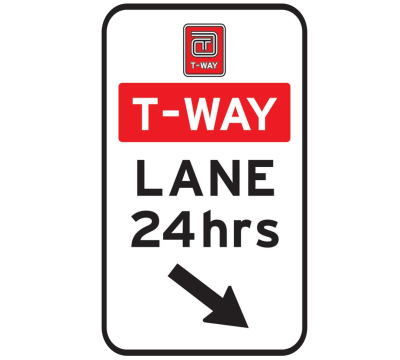
Tramways and tram lanes
Tramways
Only trams (light rail vehicles), tram recovery vehicles, some buses, and special purpose vehicles can drive in tramways.
These lanes are marked with a ‘Tramway’ sign, and two unbroken yellow lines alongside the tracks, or by a structure such as a traffic island, pedestrian refuge, or bollards.
Other vehicles can drive in a tramway to avoid an obstruction, but only if they do not move into the path of an approaching tram or bus.

Tram lanes
Only trams, tram recovery vehicles and some buses can travel in lanes marked with a ‘Tram lane’ sign.
Other vehicles can drive in tram lanes to avoid an obstruction, or if there’s a sign saying they can. They can also drive in a tram lane for a maximum of 50m to:
- enter or leave the road
- overtake another vehicle turning right or making a U-turn
- enter a lane from the side of the road.
You must not move into the path of a tram travelling in a tram lane.
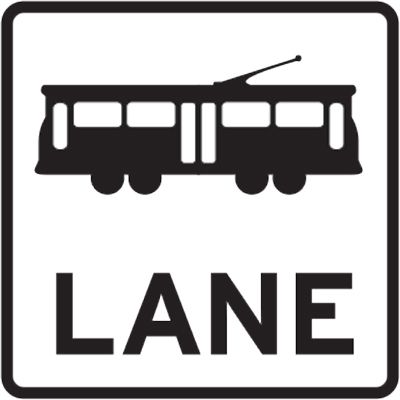
Truck lanes
Truck lanes are for vehicles over 4.5 tonnes gross vehicle mass (GVM) but can also be used by:
- bicycles
- special purpose vehicles
- Transport for NSW vehicles doing road and traffic surveys.
Other vehicles can drive in a truck lane to avoid an obstruction, or if there’s a sign saying they can.
They can also drive in a truck lane for a maximum of 100m to:
- enter or leave the road
- overtake another vehicle turning right or making a U-turn
- enter a lane from the side of the road.
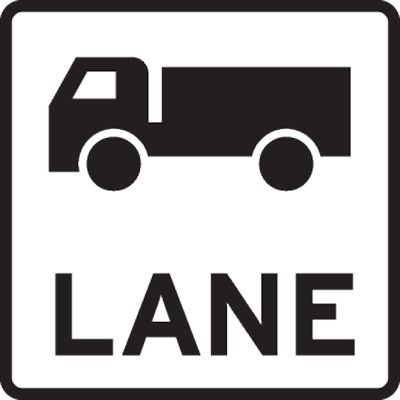
Trucks use left lane
Where a sign says ‘Trucks must use left lane’, trucks must use the left lane until a sign says they must not.
Trucks must also do this when a sign says ‘Buses’ or ‘Trucks & buses’. All other vehicles can also use this lane.
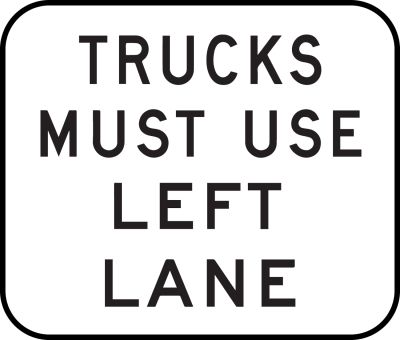
Transit lanes
Transit lanes can be used by vehicles containing a certain number of people.
Public buses and minibuses, taxis, hire cars with HC number plates, motorcycles and bicycles, as well as emergency, special purpose and breakdown vehicles, can also use transit lanes, regardless of the number of people in their vehicles.
Electric vehicles are also permitted to drive in transit lanes regardless of the number of occupants until 30 June 2025.
You can only drive in this lane during the times and days specified on the sign when there are two or more people in your vehicle, including the driver.
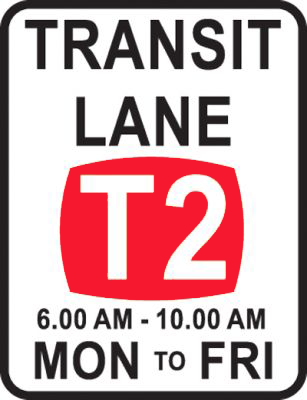
You can only drive in this lane during the times and days specified on the sign when there are three or more people in your vehicle, including the driver.
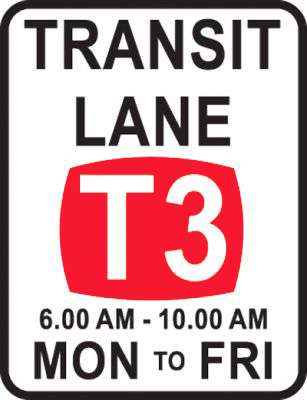
If you have less than the required number of people in your vehicle, you can only enter a transit lane for a maximum of 100m to:
- enter or leave the road
- overtake another vehicle turning right or making a U-turn
- enter a lane from the side of the road.
Any vehicle can drive in a transit lane to avoid an obstruction, or if a sign says you can.